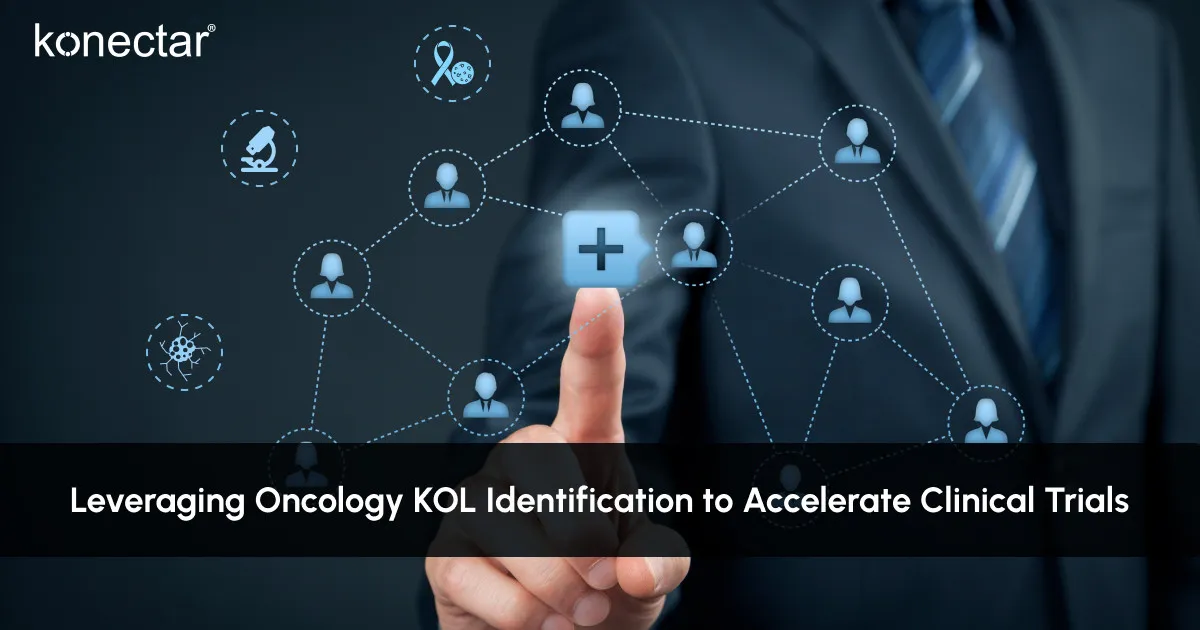30-10-2024
Leveraging Oncology KOL Identification to Accelerate Clinical Trials

While cancer clinical trials are critical for advancing cancer treatments, they often face significant delays that hinder the development of potentially life-saving therapies. The acceleration of these trials is crucial for improving patient outcomes and the overall efficiency of the healthcare system.
In this article:
In this context, Key Opinion Leaders (KOLs) play an imperative role in ensuring the success of clinical trials. This blog highlights the importance of accelerating clinical trials in oncology, and strategies for identifying relevant oncology KOLs.
Leveraging KOL Expertise to Accelerate Clinical Trials
Involving KOLs early in the trial design process can lead to better outcomes. Their insights into patient needs, treatment modalities, and clinical practices can enhance trial protocols and ensure relevance to real-world scenarios.
KOLs can facilitate patient recruitment and retention in several ways. They often have established relationships with patients, fostering trust and encouraging participation in trials.
They can help educate patients about the trial process, addressing concerns and improving understanding, which can enhance retention rates. KOLs are often involved in their local medical communities, enabling them to reach out to potential participants effectively.
KOLs often have extensive networks that can help identify potential sites for trial expansion. Their understanding of regional healthcare systems and patient demographics can facilitate the selection of appropriate trial locations.
KOL endorsements can enhance the credibility of clinical trials, positively influencing regulatory approvals. Their involvement can also engage stakeholders, including healthcare providers and payers, enhancing the trial's acceptance within the medical community.
Strategies for Identifying Relevant Oncologists
Identifying and engaging with oncologists is vital for advancing clinical trials and enhancing the development of new therapies. These experts provide invaluable insights into trial design, patient recruitment, and overall treatment strategies. Successful KOL identification involves leveraging various resources, such as academic publications, participation in clinical trials, patient advocacy, and active engagement in professional networks and conferences.
Additionally, evaluating their digital presence across social media and online platforms further helps to gauge their influence and reach within the oncology community. By aligning with the right KOLs, organizations can strengthen their clinical research efforts and contribute to the progression of oncology treatments.
Challenges in Oncology KOL Engagement
Despite the benefits, engaging KOLs in oncology clinical trials can pose challenges:
Identifying the Right KOLs for Specific Trial Needs Selecting KOLs who align with the specific needs of a trial can be challenging. It’s essential to match KOL expertise with trial objectives to maximize their impact.
Managing Conflicts of Interest and Ethical Considerations Conflicts of interest may arise when engaging medical professionals who have financial ties to pharmaceutical companies. Ensuring transparency and ethical considerations are crucial for maintaining the integrity of the trial.
Overcoming Geographic and Institutional Barriers in Global Trials Global clinical trials often face geographic and institutional barriers that can impede KOL engagement. Understanding cultural nuances is essential for effective collaboration with healthcare experts from diverse backgrounds.
Also each institution may have its own regulations regarding KOL engagement, which may necessitate careful navigation to ensure compliance. Conducting remote clinical trials for participants based in far-flung locations has also become a viable option.
Utilizing Advanced Tools and Technologies
Several tools and technologies can assist in identifying oncology KOL but konectar, an AI-powered KOL management platform, stands out as a comprehensive solution.
konectar simplifies KOL identification by leveraging advanced algorithms to analyze and visualize relationships among oncology KOLs. This enables your teams to target the right professionals for engagement more effectively.
Gone are the days of juggling multiple platforms and manually collating data to generate actionable insights. konectar consolidates all your KOL management needs into one intuitive platform to streamline the process and enhance your team's efficiency.
Request a demo of konectar today to learn more about how our platform can help you with your KOL identification process for your diverse objectives.
Conclusion
Accelerating medical trials in oncology is a multifaceted endeavor that requires strategic engagement with healthcare professionals. By employing data-driven identification techniques, clinical trial sponsors can effectively identify and engage KOLs and contribute to the rapid advancement of oncology therapies.
FAQs
-
How do KOLs contribute to accelerating clinical trials in oncology?
KOLs enhance trial design by offering expertise on patient needs, treatment protocols, and study feasibility. They also support patient recruitment through their trusted networks and facilitate regulatory acceptance, all of which help speed up the clinical trial process.
-
What are some effective methods for identifying oncology KOLs?
Oncology KOLs can be identified through data-driven analysis of publication metrics, clinical trial participation, and engagement in professional societies. Social media and digital presence analysis, as well as attending conferences, also provide opportunities to identify influential KOLs in oncology.
-
What tools and technologies assist with KOL identification in oncology?
KOL mapping software, publication databases, and professional networking platforms are commonly used for KOL identification. These tools allow trial sponsors to visualize KOL relationships, analyze research contributions, and identify influential figures in oncology.





